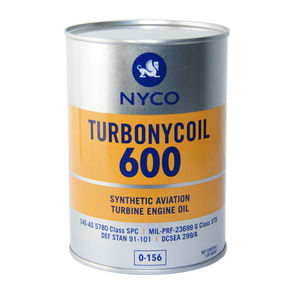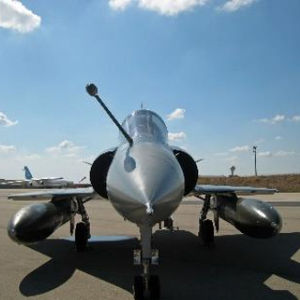
Lubricating oil TURBONYCOIL 640syntheticturbineaircraft engine
Add to favorites
Compare this product
Characteristics
- Function
- lubricating
- Composition
- synthetic
- Product applications
- turbine, aircraft engine
- Field
- for industry
- Other characteristics
- high-temperature
- Operating temperature
100 °C
(212 °F)
Description
The high temperature HTS/HPC turbine oil for hot to very hot engines
DESCRIPTION
TURBONYCOIL 640 is a lubricating oil with a viscosity of 5 cSt at 100°C. Fortified with an original in-house selected anti-oxidant, it is tailor-made to address requirements regarding low coking propensity, high resistance to oxidation and thermal degradation and elastomer compatibility.
APPLICATIONS
Gas turbine engines in military and civil aircraft (including helicopters)
Accessories (APU, IDG, starter, air cycle machine) of civil aircraft
Stationary industrial gas turbines (aero-derivative)
TURBONYCOIL 640 is recommended for use in hot running engine designs where evidence of oil coking and/or oil degradation was noted.
MAIN BENEFITS
Outstanding high thermal stability
Excellent non-coking performance
High resistance to oxidation and thermal degradation
Low foaming tendency
Superior lubricity
High conductivity
TURBONYCOIL 640 has shown higher long-term experience (+25% running operation life) versus rival oils on Allison 501-KB7S series.
APPROVALS
SAE AS5780 HPC*
MIL-PRF-23699 HTS
NATO CODE O-154
*A more stringent specification compared to MIL-PRF-23699, since it encompasses all the requirements of the military specification as well as specific OEMs testing requirements.
TURBONYCOIL 640 is approved for use on Siemens/ Rolls-Royce ground gas turbine (aero-derivative): 501-KB7, 501-KB7S and 501-KB7C engines.
Catalogs
No catalogs are available for this product.
See all of NYCO‘s catalogsRelated Searches
- Synthetic lubricant
- Synthetic oil
- Mineral lubricant
- Anti-corrosion lubricant
- Bearing lubricant
- High-performance lubricant
- Industry oil
- High-temperature lubricant
- Mineral-based oil
- Gear lubricant
- Bearing grease
- High-performance oil
- Anti-corrosion oil
- Universal lubricant
- High-temperature oil
- Chain lubricant
- Low-temperature lubricant
- Synthetic grease
- Lithium grease
- High-temperature grease
*Prices are pre-tax. They exclude delivery charges and customs duties and do not include additional charges for installation or activation options. Prices are indicative only and may vary by country, with changes to the cost of raw materials and exchange rates.








